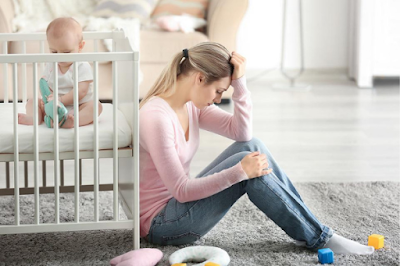How To Deal With Postpartum Depression (PPD)?
If you think postpartum depression is not real or it would just go away if you ignore it, then think again. As much as happiness you feel when you see your baby for the first time, once in the ultrasound baby scan clinic and once after you give birth, this happiness can also turn into depression right after giving birth.
There is a reason behind that. Not every woman cope with the birth of their child the same way. Most women get a mild form of PPD, also known as ‘baby blues’, but they usually go away in about two weeks. It includes mood swings, crying spells, anxiety, and difficulty sleeping. But some women experience more severe and long-lasting depression. There are two reasons for this extreme form of depression, due to the hormonal changes, and emotional distress.
There is a reason behind that. Not every woman cope with the birth of their child the same way. Most women get a mild form of PPD, also known as ‘baby blues’, but they usually go away in about two weeks. It includes mood swings, crying spells, anxiety, and difficulty sleeping. But some women experience more severe and long-lasting depression. There are two reasons for this extreme form of depression, due to the hormonal changes, and emotional distress.
Hormonal changes:
A part of the reason for PPD is a drop in the levels of hormones, i.e., Estrogen and Progesterone, after childbirth. The level of other hormones might drop dramatically, leaving you tired, sluggish, and depressed.
Emotional Distress:
When you're restless and overwrought, you may experience difficulty dealing with even minor issues. You might be on edge all the time and feel like you are neglecting your child. You may feel less appealing or feel that you've lost control over your life. Any of these issues can add to PPD.
Some symptoms might help you recognize that you have PPD.
• Depressed mood or severe mood swings
• Excessive crying
• Difficulty bonding with your baby
• Withdrawing from family and friends
• Loss of appetite or eating much more than usual
• Inability to sleep (insomnia) or sleeping too much
• Overwhelming fatigue or loss of energy
• Reduced interest and pleasure in activities you used to enjoy
• Intense irritability and anger
There are some ways that you can deal with PPD.
Exercise when you can: Exercises including, walking is great medicine for recovering from depression. So walk whenever you can and exercise at least once a day even if you don’t feel like it.
Some symptoms might help you recognize that you have PPD.
• Depressed mood or severe mood swings
• Excessive crying
• Difficulty bonding with your baby
• Withdrawing from family and friends
• Loss of appetite or eating much more than usual
• Inability to sleep (insomnia) or sleeping too much
• Overwhelming fatigue or loss of energy
• Reduced interest and pleasure in activities you used to enjoy
• Intense irritability and anger
There are some ways that you can deal with PPD.
Exercise when you can: Exercises including, walking is great medicine for recovering from depression. So walk whenever you can and exercise at least once a day even if you don’t feel like it.
Maintain a healthy diet:
Eating healthy is a regular part of staying healthy, which means if you eat nutritious food, you will feel good and that in turn can decrease your PPD.
Have some ‘me-time’:
It is important to have some time alone for yourself. Taking care of your baby is necessary, but you don’t need to do it alone. Take help from your partner, your parents, and of course babysitters.
Take a lot of rest:
Sleep whenever you can. Pregnancy and giving birth can be very tiring. It takes a lot of time to recuperate from that. Your body needs time to heal, and sleeping is the best way.
Resist isolation:
So, keep yourself in check, and even after doing all this you feel you are not being able to cope, it is better to go see your doctor.




Comments
Post a Comment